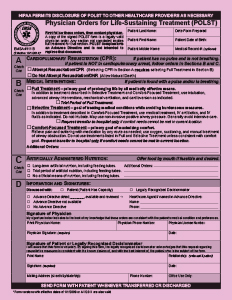 The new California POLST goes into effect on October 1, 2014, and healthcare professionals must take note of key changes to the form.
The new California POLST goes into effect on October 1, 2014, and healthcare professionals must take note of key changes to the form.
POLST (Physician Orders for Life-Sustaining Treatment) is a physician order signed by both a doctor and patient that specifies the types of medical treatment a patient wishes to receive toward the end of life. POLST is a tool that encourages conversation between providers and patients about their end-of-life treatment options, and helps patients make more informed decisions and communicate their wishes clearly. As a result, POLST can prevent unwanted or medically ineffective treatment, reduce patient and family suffering, and help ensure that patient wishes are followed.
2014 POLST Changes
Most changes to POLST in 2014 are in Sections B and C, where the order of treatment choices are reversed for consistency now starting with most aggressive treatment to least aggressive treatment. The POLST Documentation Committee and Task Force also developed goal statements for these sections in order to clarify and help patients better understand treatment options. (View a copy of the 2014 POLST as a PDF.)
All information relevant to the new POLST can be found at http://caPOLST.org/2014polst. You can also find downloadable versions of the new form in English, Armenian, Chinese, Farsi, Hmong, Japanese, Korean, Pashto, Russian, Spanish, Tagalog and Vietnamese. POLST in braille can be ordered.
POLST Education
A list of upcoming POLST education opportunities can found at https://coalitionccc.org/training-events/polst-education.
Note:
Previous versions of POLST will still be honored after the 2014 form goes into effect, however, it is ideal to complete a 2014 version of POLST—and void older versions of the form—when a patient’s POLST is updated.
POLST Questions
Healthcare professionals with questions about POLST are encouraged to connect with their local POLST Coalition, or contact the Coalition for Compassionate Care of California.
Judy Thomas, JD, is executive director of the Coalition for Compassionate Care of California (CCCC), an attorney who has worked in healthcare for more than 20 years, and is the Chair of the National POLST Paradigm Task Force.
Mark J Apfel, MD, is medical director of Anderson Valley Health Center in Boonville, CA, and serves on the California POLST Physician Leadership Council.